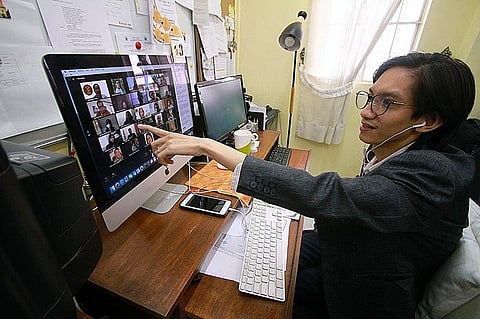

THE BALANCE to continue learning amid a worldwide pandemic has pushed educators to innovate.
As the entire sector battles to educate, the virus eliminated precious face-to-face learning in exchange for the safety of learners.
Baguio universities and colleges face a new challenge to bring quality education despite restrictions, in a city known as the education center of the North, serving thousands of students.
University of the Philippines-Baguio (UPB) Chancellor Raymond Rovillos said the higher education sector is challenged and forced to adopt and adapt to virtual learning as a mode of delivering instruction and learning.
“I am for blended learning, which is a mix of virtual learning and face to face learning, but because of this pandemic, we still cannot do blended learning. Being forced to use virtual learning capacitates the university to this mode of teaching and learning , which is really going to be the University of the Future,” he said.
The state university chancellor admitted educators along with the entire society need to rapidly adapt amidst these times of uncertainty, vulnerability, anxiety and complexity.
“This characterization of the present age was already there even before the pandemic, e.g. our students are exposed to digital sources of information, technology savvy, but with shorter attention span, etc., educators can no longer teach merely using the usual methods. We need to be more innovative and creative—always thinking out of the box,” Rovillos said.
Despite losing the opportunity for face-to-face learning, an emerging virtual trend starts for education which offers new opportunities despite its constrictions.
“[It is] still more advantageous and effective than a fully (100 percent) technology-mediated learning system. It is through the dynamic, actual interaction between and among groups of learners and teachers that brilliant ideas emerge and are sharpened,” he said.
At UPB, virtual and blended learning have been practiced decades already--the UP Open University in the UP System and the College of Arts and Communication (CAC) in UP Baguio, which was mentored by the UP Open University on the use of a learning management system (LMS) called Virtual Learning Environment (VLE).
The VLE has a synchronous (real-time) and asynchronous (at students’ preferred time) learning modalities. To date, 100 percent of UPB faculty have been trained on VLE.
“Students who have no access to internet connectivity shall be given their “learning packs” which contain all the printed learning materials available in the VLE, e.g. more detailed syllabus, PowerPoint presentations, hand-outs, exercises, quizzes, exams, etc. These learning packs shall be delivered (via couriers) to the students wherever they are,” Rovillos added.
Performance will be monitored by faculty through texting or calling (mobile phone). Because not all students have access to virtual learning via the internet or digital platforms, UP calls this strategy “remote learning" or the use of virtual/digital platforms, printed learning packs, SMS/mobile phones, emails, among others.
“Adapt, innovate/be creative and the same time- stay alive by keeping safe and healthy (in all aspects, especially mental/psychological wellness). We cannot do this alone of course. We need the support of government and other stakeholders, especially the parents.”
Education woes
The Department of Education (DepEd) reported 60,000 learners in Baguio enrolled in the school year are ready to engage in the new mode in a bid to advance and learn come October.
However, Baguio Schools Superintendent Marie Carolyn Verano said a survey shows 100 percent choose to have printed modules to learn in the new normal despite having internet connections, making the need to reproduce modules on top of priorities, despite budget deficits to facilitate reproduction.
DepEd has so far received only P43 million in funding from the central office to cover the need for reproduction of modules with costs totaling P250 million, representing 18 percent of what the department needs to carry out in reproduction needs until the end of the year.
The department is pushed to call for donations to bring in much-needed gadgets for learners in the public schools to augment needs.
At present, the department has over 2,000 teachers ready to work come October when classes open, with 200 volunteer teachers pitching in for free to augment resources of the school system.
As education must continue, schools and universities adapt to new trends that may become the future of learning, outside the four walls of the classroom.